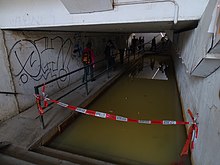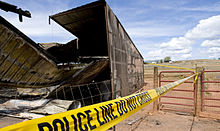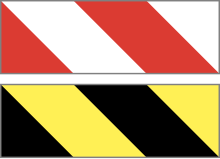This article has multiple issues. Please help improve it or discuss these issues on the talk page. (Learn how and when to remove these messages)
|

Barricade tape is brightly colored tape (often incorporating a two-tone pattern of alternating yellow-black or red-white stripes or the words "Caution" or "Danger" in prominent lettering) that is used to warn or catch the attention of passersby of an area or situation containing a possible hazard. It acts as a minor impediment to prevent accidental entrance to that area or situation and as a result enhances general safety. Barricade tape is also known as construction tape or barrier tape, or in reference to the safety hazard involved as caution tape, warning tape, danger tape or hazard tape. When used by police, the tape is named police tape.
The tape is often wrapped and affixed as a visual warning sign and demarcation, for instance against entering a dangerous area, such as an industrial or commercial building site, a roadworks construction site or the scene of an accident or a crime (for crime scene preservation), or against handling inoperative machinery or appliances.
Description

Barricade tape is made with durable, resilient, tear-proof plastic materials such as polyethylene, polypropylene, or nylon. Different manufacturers offer different sizes and thicknesses of barricade tape. Barricade tape often has a bright background and pre-printed bold warning text usually has a bright yellow color in the back. It is also possible to purchase plain barricade tape and write a custom message on it. However, care should be taken when using custom tape, as barricade tape designs may be required to comply with regulations, such as the Occupational Safety and Health Administration (OSHA) and American National Standards Institute (ANSI) regulations (when used for purposes subject to regulation by these organizations) in the USA.
Types

Barricade tape is used according to the color specifications set by OSHA and ANSI. Barricade tape may be use primarily as a safety precaution for various industries and procedures.
- Construction tape
- This is used in construction zones to notify people about ongoing construction and that there are possible hazards within the demarcated area. Construction tape usually employs a yellow-black color combination and incorporates printed text, such as "Under Construction", "Caution", "Work Zone", and "Keep Out" (among others). This type of barrier tape is commonly found at the site of renovations, demolition, and minor repairs.
- Hazard tape
- This is used in locations containing a substantial danger. Examples include electrocution hazards or areas within which there is a risk of exposure to toxic chemicals. In some regions, the specific color combination indicates the type of threat. For example, yellow-black tape may be used to signal the presence of a physical hazard (e.g., a hole), while magenta-yellow can denote a radiation hazard. This type of barrier tape is commonly used in laboratories, production areas, and industrial zones.
- Traffic control device tape
- This type of barrier tape, as its name implies is used to control traffic, whether foot traffic or vehicle traffic. Traffic control device tapes are used as temporary traffic signal to redirect traffic during parade or whenever a road is closed. These are usually brightly colored, either in solid orange or orange-white combination.
- Police tape or law enforcement tape
- This type of barrier tape is used to isolate, protect and preserve a crime scene. Police tape is used to notify the public that an investigation is ongoing and that a particular area is restricted. This is usually seen with a yellow-white, yellow-black or blue-white color combination, and usually say "POLICE LINE DO NOT CROSS" or "CRIME SCENE DO NOT CROSS".
- Firefighter tape
- This serves the same purpose as police tape and hazard tape. Firefighter tape is used to isolate a particular area during or after a fire to keep the public away from fire-related risks (e.g., smoke inhalation, airborne particulate matter, and damaged structures).
Foreground (tape) and background colours

The choice of colours of barricade tape depends on the contrast with its background, which in the case of the sky, can vary from black to white. To have a reasonable chance of being visible against most backgrounds, the tape needs a light colour (white or yellow) and a darker colour.
Requirements for barricade tape
| The examples and perspective in this section may not represent a worldwide view of the subject. You may improve this section, discuss the issue on the talk page, or create a new section, as appropriate. (May 2020) (Learn how and when to remove this message) |

Requirements for barricade tape vary according to the health and safety laws of the country or region it is being used in.
United States
OSHA and ANSI provide precise specification for barricade tape colors. These are found in OSHA regulations 1910.22 and 1910.144 and ANSI Z535.5-2007, Safety Tags and Barricade Tapes (for Temporary Hazards). However, the dimension, thickness, and materials of the barricade tape are left to the discretion of the manufacturer.
OSHA-specified barricade tape colors
- Red / white for Fire Prevention and Protection Equipment.
- Black / white for Housekeeping and Aisle Marking
- Magenta / yellow for Radiation Hazards
- Green / white for Safety and First Aid
- Blue / white for Defective Machinery
- Orange / white for Traffic and Caution Warning
- Black / yellow for Physical Hazards
ANSI-specified barricade tape colors
- Yellow/Black Barricade Tape serves as CAUTION and POTENTIAL HAZARD from:
- Excavation less than 1.2 meters (4 feet) in depth
- Identification of trip hazards and low hanging objects
- Material storage on site
- Red Barrication Tape indicates DANGER and SERIOUS HAZARD from:
- Overhead work
- Live electrical components
- Scaffold under construction
- Around swing radius of equipment with a rotating superstructure
- Magenta (Purple)/Yellow Tape denotes DANGER and POSSIBLE RADIATION EXPOSURE
- Underground warning tape (custom) warns about:
- Digging underground gas-pipeline, electric cable and OFC cable installation
- Custom thickness and width are available
- Underground work
- Protection from overground work
United Kingdom

Health and safety regulations state that markings should be placed around obstacles or dangerous locations. This includes where any of the following present a risk:
- people tripping or falling
- objects falling
- people or vehicles colliding with objects
These markings should be made up of alternating red and white or yellow and black stripes of equal size at a 45 degree angle. Barricade tape can be used to satisfy this requirement as long as the tape is "commensurate with the scale of the obstacle or dangerous location in question".
See also
References
- Harrison, Garry. "Caution tape". Repair and Enclosure Treatments Manual. E. Lingle Craig Preservation Laboratory, Indiana University Bloomington. Archived from the original on 2004-04-12.
- "1910.22 - General requirements". Occupational Safety and Health Administration. Retrieved 2021-03-03.
- "1910.144 - Safety color code for marking physical hazards". Occupational Safety and Health Administration. Retrieved 2021-03-03.
- "The Health and Safety (Safety Signs and Signals) Regulations 1996". www.legislation.gov.uk. Retrieved 2019-12-27.
External links
- Signs, Signals, and Barricades, Bureau of Reclamation
- Signs, Signals, and Barriers, United States Department of Energy
- Safety Tags and Barricade Tapes , National Electrical Manufacturers Association